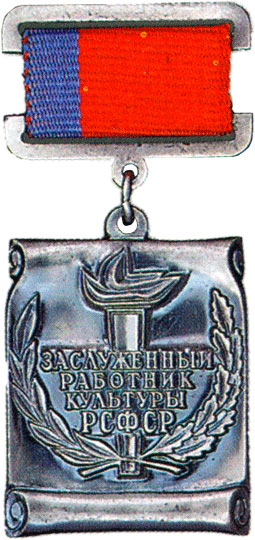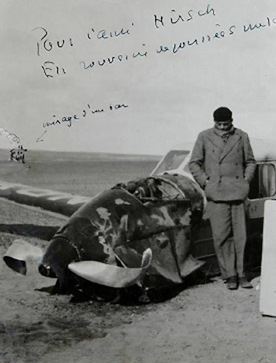|
Evgeny Sazonov
Evgeny Sazonov ( rus, Евге́ний Сазо́нов, p=evgeˈnij sazoˈnov, a=Ru-Evgeny Sazonov.ogg; born 27 September 1936) Leningrad, RSFSR, USSR) is a theater director, teacher and artistic director of Theater of Youth Creativity ( TYUT), Honored Cultural Worker of the RSFSR. Biography Evgeny's first degree was in Pediatrics. He graduated from Saint Petersburg State Pediatric Medical University and for several years worked as a pediatrician. In 1951 he enrolled in a drama club led by Matvey Dubrovin and that determined his subsequent life and career. He graduated from the Boris Shchukin Theatre Institute, majoring in directing for drama in Boris Zakhava's group. In 1974, after the death of the founder of Theater of Youth Creativity Matvey Dubrovin, he became the artistic director of TYUT. Among the students of Evgeny Sazonov, pupils of Theater of Youth Creativity contain many well known people, such as Nikolay Fomenko, Alexei Devotchenko, Roman Trakhtenberg and many ... [...More Info...] [...Related Items...] OR: [Wikipedia] [Google] [Baidu] |
Leningrad
Saint Petersburg ( rus, links=no, Санкт-Петербург, a=Ru-Sankt Peterburg Leningrad Petrograd Piter.ogg, r=Sankt-Peterburg, p=ˈsankt pʲɪtʲɪrˈburk), formerly known as Petrograd (1914–1924) and later Leningrad (1924–1991), is the second-largest city in Russia. It is situated on the Neva River, at the head of the Gulf of Finland on the Baltic Sea, with a population of roughly 5.4 million residents. Saint Petersburg is the fourth-most populous city in Europe after Istanbul, Moscow and London, the most populous city on the Baltic Sea, and the world's northernmost city of more than 1 million residents. As Russia's Imperial capital, and a historically strategic port, it is governed as a federal city. The city was founded by Tsar Peter the Great on 27 May 1703 on the site of a captured Swedish fortress, and was named after apostle Saint Peter. In Russia, Saint Petersburg is historically and culturally associated with ... [...More Info...] [...Related Items...] OR: [Wikipedia] [Google] [Baidu] |
Boris Zakhava
Boris Yevgenyevich Zakhava (russian: link=no, Борис Евгеньевич Захава; May 24, 1896 – November 12, 1976) was a Soviet and Russian actor, theater director, pedagogue and theater theorist. People's Artist of the USSR (1967). Biography He was born on May 24, 1896 in Pavlograd, Russian Empire. Yevgeny Zakhava, his father, was a graduate of Moscow Imperial Cadet School and was an officer in the Imperial Russian Army. Boris, like his father, graduated the 3rd Moscow Imperial Cadet School (1913). While being a cadet, he was acting in amateur performances. In the meantime he was involved in the centennial celebration of the victory over Napoleon in 1912, in Moscow.Internet Movie Database Zakhava studied in the acting class of Vsevolod Meyerhold (1913–1916) and acting at the Moscow Vakhtangov studio under Yevgeny Vakhtangov. Since he was being hired by Vakhtangov as an actor, Zakhava worked at his theatre (Vakhtangov Theatre) for his entire life. In 1922 he perfor ... [...More Info...] [...Related Items...] OR: [Wikipedia] [Google] [Baidu] |
The Little Prince
''The Little Prince'' (french: Le Petit Prince, ) is a novella by French aristocrat, writer, and military pilot Antoine de Saint-Exupéry. It was first published in English and French in the United States by Reynal & Hitchcock in April 1943 and was published posthumously in France following liberation; Saint-Exupéry's works had been banned by the Vichy Regime. The story follows a young prince who visits various planets in space, including Earth, and addresses themes of loneliness, friendship, love, and loss. Despite its style as a children's book, ''The Little Prince'' makes observations about life, adults and human nature. ''The Little Prince'' became Saint-Exupéry's most successful work, selling an estimated 140 million copies worldwide, which makes it one of the best-selling in history. The book has been translated into over 505 different languages and dialects worldwide, being the second most translated work ever published, trailing only the Bible. ''The Little Prince'' ... [...More Info...] [...Related Items...] OR: [Wikipedia] [Google] [Baidu] |
Antoine De Saint-Exupéry
Antoine Marie Jean-Baptiste Roger, comte de Saint-Exupéry, simply known as Antoine de Saint-Exupéry (, , ; 29 June 1900 – 31 July 1944), was a French writer, poet, aristocrat, journalist and pioneering aviator. He became a laureate of several of France's highest literary awards and also won the United States National Book Award. He is best remembered for his novella ''The Little Prince'' (''Le Petit Prince'') and for his lyrical aviation writings, including ''Wind, Sand and Stars'' and '' Night Flight''. Saint-Exupéry was a successful commercial pilot before World War II, working airmail routes in Europe, Africa, and South America. He joined the French Air Force at the start of the war, flying reconnaissance missions until France's armistice with Germany in 1940. After being demobilised by the French Air Force, he travelled to the United States to help persuade its government to enter the war against Nazi Germany. Saint-Exupéry spent 28 months in America, during wh ... [...More Info...] [...Related Items...] OR: [Wikipedia] [Google] [Baidu] |
Fahrenheit 451
''Fahrenheit 451'' is a 1953 dystopian novel by American writer Ray Bradbury. Often regarded as one of his best works, ''Fahrenheit 451'' presents an American society where books have been personified and outlawed and "firemen" burn any that are found. The novel follows Guy Montag, a fireman who becomes disillusioned with his role of censoring literature and destroying knowledge, eventually quitting his job and committing himself to the preservation of literary and cultural writings. ''Fahrenheit 451'' was written by Bradbury during the Second Red Scare and the McCarthy era, who was inspired by the book burnings in Nazi Germany and by ideological repression in the Soviet Union. Bradbury's claimed motivation for writing the novel has changed multiple times. In a 1956 radio interview, Bradbury said that he wrote the book because of his concerns about the threat of burning books in the United States. In later years, he described the book as a commentary on how mass media reduces ... [...More Info...] [...Related Items...] OR: [Wikipedia] [Google] [Baidu] |
Ray Bradbury
Ray Douglas Bradbury (; August 22, 1920June 5, 2012) was an American author and screenwriter. One of the most celebrated 20th-century American writers, he worked in a variety of modes, including fantasy, science fiction, horror, mystery, and realistic fiction. Bradbury wrote many works and is widely known by the general public for his novel ''Fahrenheit 451'' (1953) and his short-story collections ''The Martian Chronicles'' (1950) and ''The Illustrated Man'' (1951). Most of his best known work is speculative fiction, but he also worked in other genres, such as the coming of age novel ''Dandelion Wine'' (1957) and the fictionalized memoir ''Green Shadows, White Whale'' (1992). He also wrote and consulted on screenplays and television scripts, including ''Moby Dick'' and ''It Came from Outer Space''. Many of his works were adapted into television and film productions as well as comic books. ''The New York Times'' called Bradbury "the writer most responsible for bringing modern ... [...More Info...] [...Related Items...] OR: [Wikipedia] [Google] [Baidu] |
Aleksei Arbuzov
Aleksei Nikolayevich Arbuzov (russian: Алексей Николаевич Арбузов) (April 20, 1986) was a Soviet Union, Soviet and Russian Soviet Federative Socialist Republic, Russian playwright. Biography Arbuzov was born in Moscow, but his family moved to Saint Petersburg, Petrograd in 1914. His father was Russians, Russian and his mother was Greeks, Greek. Orphaned at the age of eleven, he found salvation in the theatre, and at fourteen he began to work in the Mariinsky Theatre. In 1928 he joined a group of young actors in the Guild of Experimental Drama; after its dissolution he joined a traveling agitprop theater for which he began to write plays. He moved to Moscow in 1930; in 1935 he wrote the play ''Dal'nyaya doroga'' (A long road) and in 1939 ''Tanya'', his two most successful plays. Avril Pyman writes of him, "The charm of his work lies in his shrewd but affectionate attitude to his fellow-man; he sees through human foibles to the basic desire to lead a good an ... [...More Info...] [...Related Items...] OR: [Wikipedia] [Google] [Baidu] |
Alexander Vampilov
Alexander Valentinovich Vampilov (russian: Александр Валентинович Вампилов) (19 August 1937 – 17 August 1972) was a Soviet playwright. His play ''The Elder Son'' was first performed in 1969, and became a national success two years later. Many of his plays have been filmed or televised in Russia. His four full-length plays were translated into English and ''Duck Hunting'' was performed in London and Washington DC (Arena Stage). Life Vampilov was the fourth child in the family of schoolteachers. His father, Valentin Nikitich, was of Buryats, Buryat ancestry, and his mother, Anastasia Prokopievna was Russian, the daughter of a Russian Orthodox Church priest. His father was arrested for alleged nationalist activity. The young Alexander taught himself guitar and mandolin, and his first comic short stories appeared in magazines in 1958, later collected as ''A Confluence of Circumstances'' under the name "A. Sanin". After studying literature and history at t ... [...More Info...] [...Related Items...] OR: [Wikipedia] [Google] [Baidu] |
Evgeny Schwartz
Evgeny Lvovich Schwartz (russian: Евге́ний Льво́вич Шва́рц; , Kazan, Russian Empire – January 15, 1958, Leningrad, Soviet Union) was a Soviet writer and playwright, whose works include twenty-five plays, and screenplays for three films (in collaboration with Nikolai Erdman). Life Early life Evgeny Schwartz was born in Kazan, Russia, into a physician's family. His father was baptized and was of Jewish origin and his mother Russian. In 1910 he studied law at Moscow University, where he also became involved in theater and poetry. He was drafted into the army at the end of 1916 to serve on the front. After the Bolshevik Revolution he joined the Whites and served under general Kornilov. He suffered injuries and shell-shock during the storming of Yekaterinodar in 1918, lost several teeth and acquired a tremor of the hands that plagued him for the rest of his life. After the end of Russian Civil War, Schwartz studied theater in Rostov-on-Don. In 1921 he ... [...More Info...] [...Related Items...] OR: [Wikipedia] [Google] [Baidu] |
Mikhail Arkadyevich Svetlov
Mikhail Arkadyevich Svetlov (russian: Михаил Аркадьевич Светлов), born Scheinkman (russian: Шейнкман) (, Yekaterinoslav, Russian Empire (present Dnipro, Ukraine) – 28 September 1964, Moscow, RSFSR, USSR) was a Russian poet. Biography Svetlov was born into a poor Jewish family.Biography in ''Chronos'' Online Encyclopedia He has been published since 1917. A member of Komsomol since 1919, Svetlov was sent to the First Congress of Proletarian Writers in |
Alexandrinsky Theatre
The Alexandrinsky Theatre (russian: Александринский театр) or National Drama Theatre of Russia is a theatre in Saint Petersburg, Russia. The Alexandrinsky Theatre was built for the Imperial troupe of Petersburg (Imperial troupe was founded in 1756). Since 1832, the theatre has occupied an Empire-style building that Carlo Rossi designed. It was built in 1828–1832 on Alexandrinsky Square (now Ostrovsky Square), which is situated on Nevsky Prospekt between the National Library of Russia and Anichkov Palace. The theatre was opened on 31 August (12 September) 1832. The theatre and the square were named after Empress consort Alexandra Feodorovna. The building is part of the UNESCO World Heritage Site Historic Centre of Saint Petersburg and Related Groups of Monuments. It was one of the many theatres of the Imperial troupe. Dramas, operas and ballets were on the stage. Only in the 1880s, the theatre has become dramatic and tragedy filled. The premières of n ... [...More Info...] [...Related Items...] OR: [Wikipedia] [Google] [Baidu] |
Tovstonogov Bolshoi Drama Theater
Tovstonogov Bolshoi Drama Theater (russian: Большой драматический театр имени Г. А. Товстоногова; literally ''Tovstonogov Great Drama Theater''), formerly known as Gorky Bolshoi Drama Theater (russian: Большой Драматический Театр имени Горького) (1931–1992), often referred to as the Bolshoi Drama Theater and by the acronym BDT (russian: БДТ), is a theater in Saint Petersburg, that is considered one of the best Russian theaters.''Emperor Theater on Fontanka The theater is named after its long-time director . Since 2013, [...More Info...] [...Related Items...] OR: [Wikipedia] [Google] [Baidu] |




